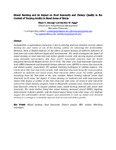| dc.description.abstract | Sustainability in agricultural production is key in ensuring food and nutrition security. Mixed farming has been touted as one of the farming systems for enhancing this sustainability. However, there is limited evidence on the effects of mixed farming on different indicators of food insecurity under different biophysical environments. This study investigates the impact of mixed farming on food insecurity and dietary quality in areas with varying degrees of aridity using nationally representative data from 10,817 households extracted from the Kenya Integrated Household Budget Survey 2015/2016. The study uses Food Insecurity Experience Scale (FIES) framework and household dietary diversity score (HDDS) to assess food insecurity and dietary quality, respectively. We applied matching techniques to estimate impacts. Our results show that food insecurity prevails, with mild food insecurity being the most prevalent, followed by moderate and severe levels. Food insecurity differs across the aridity gradient, increasing from the Non-ASAL to the Arid counties. Mixed farming reduced severe food insecurity in all areas, but impact of mixed farming on moderate and mild food insecurity varied with degree of aridity: in the Non-ASAL and Arid areas, all levels of food insecurity reduced for mixed farming adopters, while in Marginally semiarid areas, moderate and severe food insecurity reduced. In Largely semiarid areas, mixed farming reduced only severe food insecurity. The study further found that mixed farming increased overall HDDS, implying improvement in dietary quality, with the largest impact being in the drier areas. Our findings suggest that policymakers should support agro-pastoralists to scale up mixed crop-livestock farming as a strategy to sustainably improve food security and dietary quality. | en_US |

